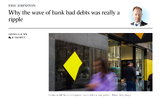- Joined
- 3 November 2013
- Posts
- 1,610
- Reactions
- 2,874
If your in mortgage stress you have options particularly when you’ve been with a bank for an extended period.
if you can demonstrate sever hardship you can ask to cap your interest rate at what you can afford and add the extra to the back end
As one example
the bank doesn’t want to foreclose people for a couple of % over a few years.
if you can’t negotiate have a professional act on your behalf.
My wife did this in 87 and banks were way tougher then!
Also the assessment buffer for certain refinances has been dropped to 1% compared to 3%, so might be worthwhile speaking to a broker


